|
|
|
Sort Order |
|
|
|
Items / Page
|
|
|
|
|
|
|
| Srl | Item |
| 1 |
ID:
132358
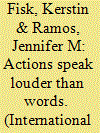

|
|
|
|
|
| Publication |
2014.
|
| Summary/Abstract |
How and to what extent is the preventive use of force becoming the future of foreign policy for states around the world? We explore the spread of preventive logic to increasing numbers of states and examine the degree to which an international norm toward preventive self-defense is cascading in the international system. Through content and comparative case study analysis, we investigate leaders' rhetoric and security policies concerning what we theorize is the key indicator of a country's emulation of the United States: assertion of the right to the unilateral, preventive use of force outside of its borders. Our evidence indicates that there has been a shift away from the established international norm-which considers the use of preventive force illegal and illegitimate-toward growing acceptance of unilateral preventive strategies, a shift largely propelled by the precedents set by the United States in the war in Iraq and its use of unmanned aerial vehicles (UAVs or drones) in the global war on terror. Our findings also reveal that some states are applying the strategy of preventive self-defense beyond the use of UAVs for targeted killings to the extreme contingency plan for nuclear war. We conclude by discussing possibilities for further research and considering the implications of this phenomenon.
|
|
|
|
|
|
|
|
|
|
|
|
|
|
|
|
| 2 |
ID:
132355
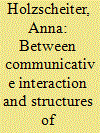

|
|
|
|
|
| Publication |
2014.
|
| Summary/Abstract |
This paper discusses contemporary engagement with the theory and analysis of discourse in international relations. It argues that discourse understood as "meaning in use" has emerged as one of the core concepts in constructivist scholarship, being of tremendous theoretical and analytical value. The paper identifies two distinct types of discourse analysis around which most contributions in this field converge: micro-interactional approaches that emphasize the communicative, pragmatic aspects of discourse and macro-structural approaches focusing on discourse as structures of signification. What unites these studies is their interest in the diffuse power relationships that characterize social interaction in international politics and the productive effects of power that the term "discourse" serves to underline. Through a combination of these two different strands of discourse research, with two different conceptualizations of power (deliberative and productive), the paper develops a taxonomy of discourse approaches that reflects four distinct variants of discourse research. These variants are illustrated by means of an in-depth discussion of recent innovative studies. In conclusion, the paper points to a number of limitations in the present conceptualization of power through discourse as well as in terms of the uneasy combination of positivist epistemology and constructivist ontology in much empirical discourse research. Discussing the overlap between discourse and practice scholarship, the paper sketches future directions for research in this field.
|
|
|
|
|
|
|
|
|
|
|
|
|
|
|
|
| 3 |
ID:
132374
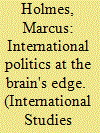

|
|
|
|
|
| Publication |
2014.
|
| Summary/Abstract |
Social neuroscience has seen a profound rise in other social science disciplines, such as economics, yet there has been relatively little systematic analysis of the usefulness of social neuroscience for international relations and the study of world politics. This article suggests that while there are many potential explanations for why this might be the case, one important barrier to adopting neuroscience may be our metaphysical assumptions and philosophical wagers. I suggest that if all politics is rooted in the brain, then two distinct arguments regarding agent-structure are plausible. One argument suggests that structure becomes redundant once the brain is accounted for; the other suggests that the brain simply drops out as epiphenomenal. After all, if all politics is reflected in the brain, then the brain itself is less interesting than the structure being reflected. These wagers ultimately relate to positions we take on the mind-body problem and well-known ideational-material divide. New research in neuroscience and philosophy of mind suggests that this binary distinction can be overcome, suggesting a new "via media" between ideas and material that may offer significant promise for both theory and practice.
|
|
|
|
|
|
|
|
|
|
|
|
|
|
|
|
| 4 |
ID:
132373
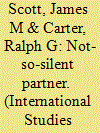

|
|
|
|
|
| Publication |
2014.
|
| Summary/Abstract |
The conventional narrative surrounding the post-9/11 "War on Terror" tends to characterize the US Congress as a mostly inactive and compliant bystander, bowing to an aggressive assertion of unilateral presidential authority and power by the Bush administration. However, clarifying the conceptual framework used to examine legislative-executive interactions and congressional foreign policy behavior to account for varying patterns of interaction and varying avenues of influence yields an alternative explanation. While there is some truth to the conventional wisdom about a Congress rallying to support the president in time of war, applying the refined conceptual framework brings a more complex story into sharper focus. Viewed through this alternative lens, we see that members of Congress, and the institution as a whole, played a more discriminating and substantial-yet still predictable-role consistent with the context of the situation and the broad historical forces and patterns that combine to shape congressional foreign policy behavior and influence. Once the context and forces shaping congressional behavior and legislative-executive interactions are understood, congressional engagement (or lack thereof) in the War on Terror from 2001 to 2009 emerges as a relatively predictable sequence of initial compliance, (rallying) giving way first to competition and then to confrontation.
|
|
|
|
|
|
|
|
|
|
|
|
|
|
|
|
| 5 |
ID:
132350
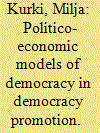

|
|
|
|
|
| Publication |
2014.
|
| Summary/Abstract |
This piece examines the curious nature of the conceptual foundations of current democracy promotion practice. I point out that while it is broadly accepted today that a liberal democratic politico-economic model should stand at the heart of democracy promotion, the scholarly literature on democracy-capitalism relationship stands in sharp contrast to this consensus in highlighting the contested nature of this relationship. Through a survey of some of the key theoretical texts on capitalism and democracy, and a brief empirical survey of politico-economic contours of current democracy promotion, this article highlights the poorly thought-through links between capitalism and democracy in current democracy promotion. It is argued here that un-reflexive conjoining of democracy and liberal capitalism and sidestepping of the plurality of nuanced positions on this relationship in scholarly literature is problematic and that revisiting the lines of contestation over the relationship between capitalism and democracy is deeply consequential for re-evaluating and revising democracy and market promotion policies in the current context of "dual crisis" facing democracy promoters today.
|
|
|
|
|
|
|
|
|
|
|
|
|
|
|
|
| 6 |
ID:
132375


|
|
|
|
|
| Publication |
2014.
|
| Summary/Abstract |
India's Ganges River has suffered from massive amounts of pollution for decades, and despite numerous attempts, the Indian government has failed to clean up this historic water resource. This governance failure prompted the growth of civil society groups whose stated purposes included the mitigation of Ganges pollution and the empowerment of community-based solutions. These types of groups, however, have not found sustained success in alleviating Ganges pollution, despite their compatibility with the constitutional decentralization of Indian water policy. A case study of one of these civil society organizations, the Sankat Mochan Foundation (SMF), serves as a first step in assessing the efficacy of this community-based approach to Ganges pollution mitigation. From a broader perspective, the story of the SMF speaks to the difficulties inherent in environmental policy decentralization and to the struggles of norm creation and diffusion across societies. Indeed, this case is particularly instructive, as it exposes potential vulnerabilities in the literature regarding the role of civil society groups as norm entrepreneurs. Rather than allow for the democratization of water policy, as called for by the Indian constitution, the case of the SMF suggests the Indian government has entrenched centralization to the point of diffusing civil society opposition and ultimately compromising the overall impact of its resistance.
|
|
|
|
|
|
|
|
|
|
|
|
|
|
|
|
|
|
|
|
|